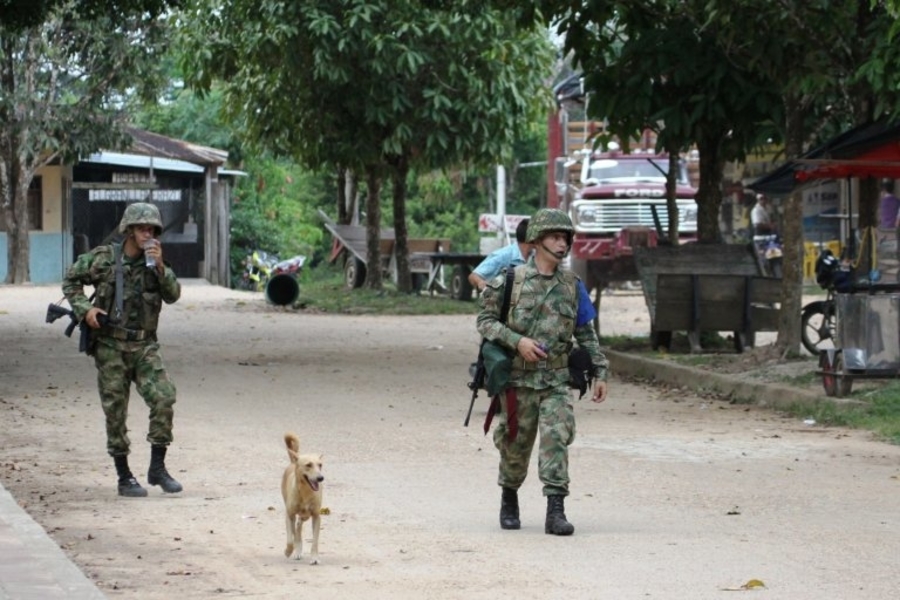The International Corner: Colombian Peace and Justice
Published: October 5, 2016
What happened?
After a 52 year long armed conflict, the Colombian government and the FARC Rebel Group have reached a peace deal and cessation from hostilities. This historic, and much needed, agreement was signed on Sept. 27. However, in order for the peace deal to be ratified, Colombia requires a public referendum. The ‘yes’ vote needed to win is a simple majority of voters (50%).
On Sunday, the referendum was defeated by 4% of the voter population. The main reasons that this referendum was defeated are many believe that the FARC leaders would be getting off too easily, the government’s plan to financially assist rebel leaders and the FARC would also get 10 seats in the government. The majority of Colombia is unsettled by the latter because the FARC is a Marxist group that many accuse of having strong ties to the Cuban communist government.
Who are the FARC?
The FARC stands for Las Fuerzas Armadas Revolucionarias de Colombia (The Revolutionary Armed Forces of Colombia). They were founded in 1964 under communist ideologies. At its peak, the FARC had upwards of 30,000 soldiers. Their size has decreased considerably to between 5,000 and 10,000 soldiers.
Colombia, like many other Latin American countries, has been almost totally influenced by an aristocratic economic upper class. These elites owned almost all of the land and farms in Colombia as well as controlled most of the seats in the government. With a global rise in communism, much of Latin America saw that communism was a better alternative to their current plight. The basic ideology of communism, although it has many forms, is that everyone is equal in rights, income and social status. Naturally, the lowest classes of strong economically polarized countries, such as Colombia, found refuge and hope in this growing global trend.
After a growth in power of the FARC, the fiscally elite Colombian government decided to send in the army to break up small communities that the rebel group had set up. This then triggered the coalition of the small fed up communist groups to take up arms and fight, leading into one of the longest modern civil wars.
The FARC has been considered a terrorist group by many countries the international community for decades, including the United States. However, before the peace agreement was to be signed the, European Union announced that they would remove them from their terror list. Neighboring countries like Venezuela and Ecuador view the FARC as a legitimate army and urge the Colombian government to recognize it as such, but the Colombians continually say that their conflict is only an “armed conflict” and not a legal “civil war.”
What should be done?
In order to make every party happy in this peace agreement, the main issue for the Colombian people is justice, and fair justice. Under the current deal, there would be special courts, or tribunals, set up to specifically try the FARC leaders. Also, it was specified that if the FARC leaders plead guilty to their crimes that their punishments would be less severe. This caused people’s corruption and injustice flags to go up immediately.
The most politically and legally sound way to deal with such crimes would be an independent investigation by the International Criminal Court or the establishment of an international criminal tribunal instead of a local one.
The International Criminal Court (ICC) was established in 2002 with the Rome Statute. Under Article 14(1) of the Rome Statute, Colombia is able to submit a referral for the the Prosecutor of the ICC to investigate the situation with the FARC. Then if the ICC mission to Colombia finds that the FARC has committed any crimes against humanity, crimes of aggression, war crimes or genocide, and if Colombia drops all investigations into the FARC, then the Prosecutor is able to issue a warrant for the arrest of specific leaders in the FARC. Then once the state, Colombia, arrests these people, they can then send them to The Hague, Netherlands, where the ICC is located, to stand trial for their accused crimes.
Although historically the Gran Colombiana countries (Colombia, Venezuela, and Ecuador) have been very against western involvement into their affairs, Colombia should follow this path of justice. International law is a relatively new concept and the ICC is just over a decade old. The ICC along with other ad hoc tribunals have prosecuted the worst of humanity and have had tremendous success in finding out the truth behind incidents and bringing those responsible to justice.
The situation in Colombia has been under preliminary investigation since 2004. This is the period in the process in which the ICC has not issued a warrant for anyone yet, but they are amassing evidence and learning more about the state of conflict Colombia has been in.
In a statement from the ICC Prosecutor Fatou Bensouda, she expresses her support of the judicial actions made by the Colombian Government but reminds the international community that the ICC is fit for the job if the Colombian government fails to bring those responsible for alleged crimes to justice.
“The ends of sustainable peace are intrinsically linked to justice being done and seen to be done. As Colombia opens a new chapter in its history towards the promise of peace, my Office will continue to support those efforts in accordance with its mandate under the Rome Statute with independence, impartiality and objectivity,” ICC Prosecutor Fatou Bensouda said.
Update: President Juan Manuel Santos of Colombia was awarded the Nobel Peace Prize for his efforts to reach any sort of peace agreement with the Farc.






![2025 Snowcoming Pep Assembly [Photo Gallery]](https://FHNtoday.com/wp-content/uploads/2025/03/IMG_9969-300x200.jpg)
![2025 Snowcoming Dance [Photo Gallery]](https://FHNtoday.com/wp-content/uploads/2025/03/Snowco2025-Hmartin-3-300x200.jpg)
![Girls Soccer Holds Fourth Day Of Tryouts [Photo Gallery]](https://FHNtoday.com/wp-content/uploads/2025/03/AOrozco_Soccertryouts_3.6-20-300x200.jpg)

![Baseball Holds Their Last Day of Tryouts [Photo Gallery]](https://FHNtoday.com/wp-content/uploads/2025/03/baseball-tryouts-3.7-austin-griffin-11-300x200.jpg)


